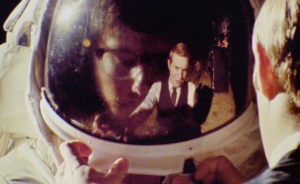 Review: Limited Run
Review: Limited Run
Operation Avalanche | Matt Johnson | USA | 2016 | 94 min
Union South Marquee Theatre, Friday, January 20 through Sunday, January 22»
Operation Avalanche does not live up to its festival circuit buzz, but it provides enough invention and moxie to remain entertaining and endearing.
Operation Avalanche is a one-joke film, but it is a pretty good joke. What if there were documentary footage confirming the conspiracy theory that Apollo 11 never landed on the moon, and everything we think we know about the giant leap for mankind was faked?
Director and co-writer Matt Johnson answers that question with a spirited recreation of 1960s America that follows two young CIA recruits as they stumble and bumble their way into what would be the greatest hoax in history.
Johnson and Owen Williams play two young and ambitious CIA recruits (named Matt Johnson and Owen Williams) whose filmmaking skills and hubris leads them to NASA headquarters in search of a Russian mole. Like the real Johnson and Williams, who posed as documentary filmmakers to shoot on NASA locations, the fictional Johnson and Williams pose as National Educational Television filmmakers on assignment. After tapping NASA administrator James Webb’s phone, Johnson discovers that current technology will not be sufficient to land a manned mission on the moon before the end of the decade, as promised by President Kennedy in 1962. Johnson transforms this information into another career opportunity: he pitches the idea to shoot a film to fake the one part of the mission that could not be achieved: the actual moon landing.
The strengths and the weaknesses of Operation Avalanche derive from its use of the Blair Witch-style (or, Office-style) faux documentary trope. Strengths include a loving recreation of 1960s America, not the over-hippied representations we often get, but the straight-laced shirt-and-tie professional world of the CIA and NASA. Johnson clearly understands that young professionals in the 1960s still looked a lot like they did in the 1950s. Inventive use of historical footage provides another strength, including integrating Johnson with historical figures (most amusingly with Stanley Kubrick). Sure, we’ve seen this kind of thing before and after Forrest Gump, but Operation Avalanche delivers all of these tricks with a light touch and a strong sense of play.
The early playful tone makes the shift to the more suspenseful third act startling as Johnson, Williams and their crew slowly realize how dangerous their knowledge of the hoax has become. A low-tech car chase right out of Gun Crazy builds up to a surprisingly effective shoot-out that reminded me of Mr. Pink’s post-robbery escape in Reservoir Dogs in its blunt simplicity.
The playfulness combined with the cops-and-robbers violence reminded me of another set of filmmakers: the young boys who remade Raiders of the Lost Ark (documented in Raiders!: The Story of the Greatest Fan Film Ever Made). There’s never any doubt that Johnson and his crew love movies, and love making movies.
The dramatic maturity and sophistication of Operation Avalanche does not go much beyond that Raiders fan film, however. The faux-documentary structure emphasizes the mission (and jokey references to history) but fails to provide much in terms of character and interpersonal relationships. While Johnson’s character exudes a goofy charm, there’s not much to him beyond his conspiratorial ambitions, to the point that he seems to play the same note for 90 minutes. Williams provides a more well-grounded foil, but making him more normal than Johnson also makes him more bland. Attempts to create tensions between the two seem forced, as are the attempts to convey their friendship in “older” footage. There’s little compelling interpersonal drama here, and the more overt scene-based humor rarely provokes more than a smile.
Even the larger drama of the mission is undermined by the fact that, well, we know they must at least get the hoax completed, right? Without the hoax succeeding, Operation Avalanche would be no concept instead of high concept.
Ultimately, one has to turn one’s brain (or knowledge of film technology in the 1960s) off at several points for the film to work, beyond the basic suspension of disbelief. The trope of constantly filming works in the context of video or even phone cameras, but it doesn’t work as well for 16mm magazines and 1960s film sound. Sure, direct cinema/cinema verite documentaries liberated the camera with new technologies, and there are faux-diary films that emerged in the 1960s like David Holtzman’s Diary (Jim McBride, 1967). But during scene after scene, I kept telling myself “That wouldn’t work that way.” Eventually I had to stop thinking, even to make scenes I liked work.
Operation Avalanche received a lot of buzz at the Sundance Film Festival (Johnson turned down a chance to premiere at the Toronto International Film Festival). That buzz lasted through last year’s festival season (including its late addition to the Wisconsin Film Festival). Despite my admiration for the film, I’m not surprised that the buzz died down (its current rating at Rotten Tomatoes is 69%) or that the film did not return to Madison for a theatrical run.
That said, I’m glad that Operation Avalanche will kick off WUD Film programming for this semester. I’m confident that (the real life) Johnson’s can-do attitude will inspire several young filmmakers on campus.